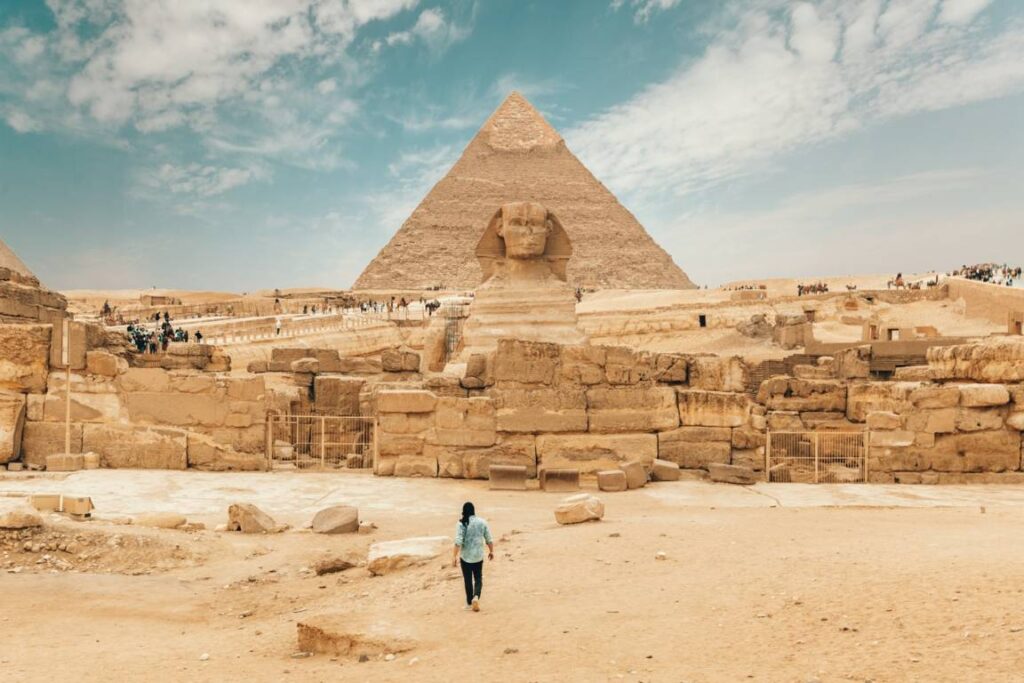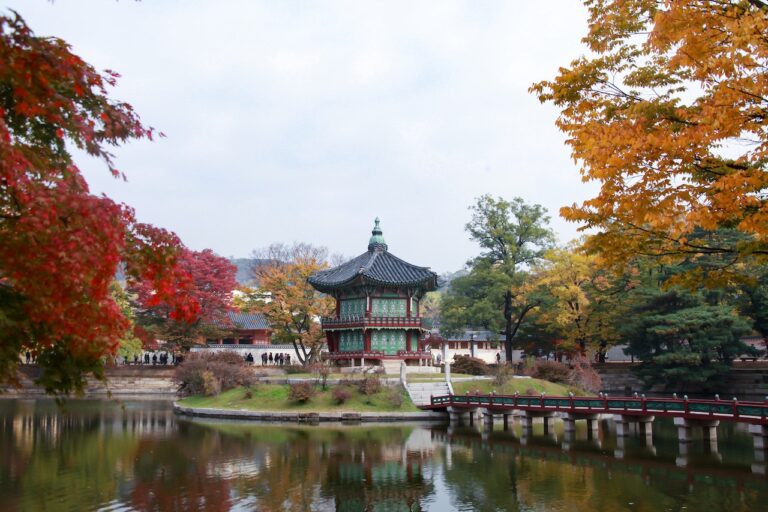The original 7 wonders of the world were a collection of awe-inspiring structures and natural formations that were listed in a document written by Antipater of Sidon c. 140 BC. This list was compiled to commemorate the accomplishments of seven remarkable men: builders, poets, and rulers from across the ancient world. While many of these structures have been lost to time, their legacy remains in the many stories and legends that have been told about them.
The Wonders of the World are some of the most iconic tourist destinations in the world. Spanning from antiquity to the present day, these sites have withstood the test of time and continue to amaze visitors today. Here are their corresponding names and details.
The original 7 wonders of the World
The wonders of the world included the Great Pyramid of Giza, the Hanging Gardens of Babylon, and the Temple of Artemis at Ephesus, the Statue of Zeus at Olympia, the Mausoleum at Halicarnassus, the Colossus of Rhodes and the Lighthouse of Alexandria.
Since the dawn of civilization, people have been fascinated by the world around them. From the tallest mountain to the deepest sea, humans have tried to understand and conquer these natural wonders. Today, these wonders remain some of humanity’s most impressive achievements. The following is a list of the original 7 Wonders of the World with their names and details.
The Pyramids of Giza, Egypt
The Pyramids of Giza are some of the most famous and oldest man-made structures in the world. They were built over 4,500 years ago and are still standing today. The Great Pyramid of Giza was the tallest structure on Earth for over 3,800 years. It is built from over 2 million blocks of stone and has a volume of more than 2.6 million cubic meters. The Great Pyramid of Giza stands at a height of 146 meters (481 feet) and has an area of 6.5 hectares (16 acres).
The pyramid is faced with smooth limestone blocks that are about 2.5 meters (8.2 feet) thick. The Great Pyramid of Giza is located on the Giza Plateau in Egypt. It is located in the center of a large, open area surrounded by a maze of narrow streets and buildings. It sits at the end of a long causeway that has been constructed between two small islands. The Pyramids of Giza are one of the oldest of the original 7 wonders of the world and are still an impressive sight today.
The Hanging Gardens of Babylon, Iraq
The Hanging Gardens of Babylon were one of the Seven Wonders of the World. They were built by King Nebuchadnezzar II in 600 BC as a present for his wife, Queen Amyitis. The gardens were located on the banks of the Euphrates River in what is now modern-day Iraq.
They have constructed over 2,000 years ago and were destroyed by an Earthquake in the 8th century AD. The gardens were built on top of a palace for Nebuchadnezzar II, King of Babylon. The gardens were made up of a series of terraces that were planted with trees, flowers, and grasses. The gardens were covered with an outer wall of stone and an inner wall of brick for privacy. The garden was about 150 feet wide by 150 feet deep. At its height in the 7th century BC, the Hanging Gardens were said to cover approximately 200 acres (80 hectares).
The Hanging Gardens of Babylon (also called the Ishtar Gardens) were destroyed in 539 BC. The gardens were built on a series of terraces that covered approximately 150 acres (60 hectares). The gardens had an outer wall of stone and an inner wall of brick for privacy. The Hanging Gardens were the highest and most renowned of the gardens built by Nebuchadnezzar II, who ruled from 605 BC to 562 BC.
The Statue of Zeus at Olympia, Greece
The Statue of Zeus at Olympia, Greece is a monumental sculpture that was created by the Greek sculptor Phidias in the 5th century BC. The statue was placed inside the Temple of Zeus at Olympia, and it was one of the most famous and celebrated works of art in Ancient Greece. The statue was made of ivory and gold, and it depicted Zeus sitting on his throne.
The Statue of Zeus at Olympia, Greece is a magnificent sight to behold. It is one of the most famous statues in the world and is considered one of the original 7 wonders of the world. It was placed inside the Temple of Zeus at Olympia and was used as an object of worship. The statue was destroyed in a fire in AD 426, but its remains were excavated and are now on display in the Louvre Museum in Paris.
The Temple of Artemis at Ephesus, Turkey
The Temple of Artemis is located in Ephesus, Turkey and it is one of the largest of the original 7 wonders of the world. The temple was dedicated to the goddess Artemis and it was one of the largest temples in Greece. The temple was destroyed by a fire in 356 BC, but it was rebuilt soon afterward. The temple was destroyed again by an earthquake in 262 AD and it was never rebuilt again.
The Temple of Artemis was the most famous and sacred site in ancient Ephesus. It was a center of worship for the Greek goddess Artemis, who was called Diana by the Romans. The temple was built on a hill and it was the largest building in the city of Ephesus. The temple was built on a hill that gave it a commanding view of the city of Ephesus. It was one of the historical temples in Greece. The temple cost around 100,000 talents and it was financed by gifts from the people of Ephesus.
The Mausoleum at Halicarnassus, Turkey
The Mausoleum at Halicarnassus was built by King Mausolus of Caria and his wife Artemisia. The mausoleum was destroyed by an earthquake in the 12th century, but its ruins still stand today. The Mausoleum at Halicarnassus was one of the Seven Wonders of the World.
It is located in modern-day Turkey and was built between 350 BC and 353 BC by King Mausolus of Caria. The mausoleum was renowned for its grandeur and beauty, and it is considered to be one of the most significant examples of ancient Greek architecture. The Mausoleum at Halicarnassus was one of the oldest in 7 wonders of the world. It is located in modern-day Turkey.
Colossus of Rhodes, Greece
The Colossus of Rhodes was one of the Seven Wonders of the Ancient World. It was a statue of the sun god, Helios that stood over 100 feet tall. The statue was built in 280 BC to celebrate Rhodes’ victory over the island of Cyprus. The Colossus stood for only 56 years before it was destroyed by an earthquake.
A colossal statue of the sun god Helios once stood guard over the harbor at Rhodes, Greece. The magnificent marble statue was completed in 282 BC and was one of the Seven Wonders of the Ancient World. At more than 110 feet high, it was one of the tallest statues of its time. The Colossus of Rhodes was destroyed by an earthquake in 226 BC, but its memory lives on in history and legend.
Pharos Lighthouse at Alexandria
Pharos Lighthouse at Alexandria was one of the Seven Wonders of the World. It was a lighthouse built in the 3rd century BC on an island near Alexandria, Egypt. The lighthouse was designed by Sostratus of Cnidus and it was said to be over 300 feet high. It was destroyed by an earthquake in the 14th century AD.
It was constructed in 290 BC by Ptolemy II Philadelphus and it was destroyed in the earthquake of 956 AD. The lighthouse was a massive structure made of limestone blocks, standing over 120 meters high. It had three stages, each with a different diameter, and a crenelated top. The light from the lighthouse could be seen up to 36 kilometers away and it served as an important navigational aid for ships sailing into Alexandria Harbor. There was a lighthouse erected at the mouth of the River Mersey in England in 1609, by Henry Hudson, to warn ships entering the river. This lighthouse was known as “the Old North Point Lighthouse”. The current lighthouse was completed in 1824 and it is still standing today.
The original 7 wonders of the world were a collection of awe-inspiring structures and sculptures that were listed by various ancient writers, including Herodotus and Philo of Byzantium. The list was compiled to inspire travelers and tourists to see these amazing sights for themselves. Although the original list has been lost to time, historians have been able to reconstruct it based on ancient texts. The seven wonders included the Great Pyramid of Giza, the Hanging Gardens of Babylon, the Temple of Artemis at Ephesus, the Statue of Zeus at Olympia, the Mausoleum at Halicarnassus, the Colossus of Rhodes, and the Pharos Lighthouse at Alexandria.
Information technology as a career.







Comments are closed.